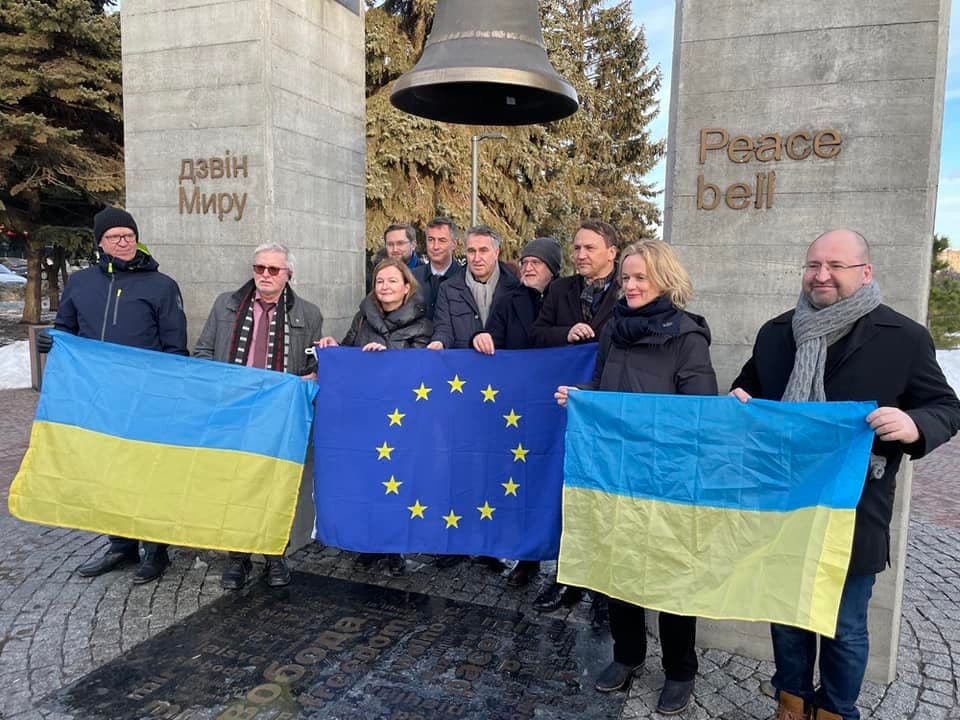Op-ed by MEPs: Ukraine, do not panic, raise the alarm!

Petras Auštrevičius, Renew Europe
Włodzimierz Cimoszewicz, The Progressive Alliance of Socialists and Democrats
Michael Gahler, European People’s Party
Radosław Sikorski, European People’s Party
Viola von Cramon-Taubadel, Greens/EFA
Over 135 000 Russian soldiers are now positioned along the Ukrainian border; 30 000 Russian combat troops mobilized in Belarus have started what the Kremlin calls a “military exercise”; convoys of Russian military equipment and personnel have been flooding annexed Crimea and occupied Donbas for months now. The situation is fast approaching a tipping point where Russia can easily launch and successfully complete a full-scale invasion of the whole country. We are not speaking here of a regional conflict that Ukraine has unfortunately grown used to during the past 8 years, this time, we are speaking of a full-blown war, the scale of which has been unknown to this continent since WWII.
In such circumstances, we, Members of the European Parliament and long-standing friends of Ukraine had countless recent encounters (including visits to Kyiv and Mariupol) with the public and high-ranked officials of Ukraine to express solidarity with the people of Ukraine and to send an unwavering signal that the country does not stand alone against the Russian aggression. To our surprise, the mood we came across in Ukraine mismatches the objective reality. Such mismatch manifests itself in all facets of social life, from the streets of Kharkiv and Kyiv to the most cabinets of political elites.
Less than half of Ukrainians believe that the Russian invasion is likely whereas such concern is significantly higher among the populations of those countries that also have a long history of resisting Russian aggression. The grimmer outlook of possible Russian invasion in Ukraine expressed by Poles, Romanians, Swedes, and other Europeans is corroborated by the findings of the most sophisticated intelligence services of the world that have reiterated that Putin might launch the offensive any day now.
The prevalent mood of downplaying threats in Ukraine, during the calm right before the storm, is understandable as it grants a needed sense of security but it is not the most prudent approach in the face of glaring danger.
It is correct that we do not know what Putin’s endgame is (perhaps not even Putin himself does); it is also correct that sowing panic is the last thing Ukraine’s financial markets and its peace-loving people need. Yet, there is a big difference between not sowing panic on one hand and downplaying the indubitable threats on the other. While the first demonstrates a stoic fortitude of Ukrainians, the latter risks leaving the country and its people exposed and unprepared.
A sensible counterbalance to panic and fearmongering is, as counterintuitive as it may sound, rising alarm among the international community and building up the resilience of the population towards the imminent danger.
We have a difficult obligation to discuss honestly with over 40 million Ukrainians that the threat is real but the country does not stand alone in this asymmetric challenge.
Ukraine is a part of the European civilization sharing fundamental values with the EU. This is why the majority of Polish, Swedish, French and even German societies believe that their respective countries should defend Ukraine from the Russian aggression. This is also the reason why the most ardent friends of Ukraine in the European Parliament and elsewhere extend their full support for Ukraine’s EU membership when the country fulfills all technical criteria. This is why thousands of key western politicians are working tirelessly to avert the impending tragedy without compromising Ukraine’s interests and values. The extraordinary threat that Putin’s Russia is now posing will be countered by unprecedented measures. We are fully engaged and ready to act!
Different scenarios are now being worked out to make sure that Putin’s Russia will face the harshest consequences if it launches a new invasion. Meanwhile, it is our task to work tirelessly for building up resilience among the Ukrainian society and strengthening the country’s financial and self-defense capabilities. Western politicians also have an uneasy task of persuading the skeptical minority of their societies that standing up for Ukraine is more than just standing up for a victim of aggression – it is, in fact, tantamount to standing up for the western values and the rules-based international order as we know it.
Strong international attention underpinned by precise media reporting keeps Ukraine on the top of the agenda and as long as there is an international outcry and consolidated action, Putin will think twice before launching an offensive. On the other hand, dwindling interest and the false sense of security would spell disaster for Ukraine as Putin can act with impunity while facing only minimal resistance from the international community.
This is why we all, inside and outside of Ukraine, must call a spade a spade, not deny the imminent threat, alarm the international community and build up the resilience of the Ukrainian people. All this without sowing panic. Such a delicate balancing will be a sign of good leadership and we, international friends of Ukraine will support it by all means.